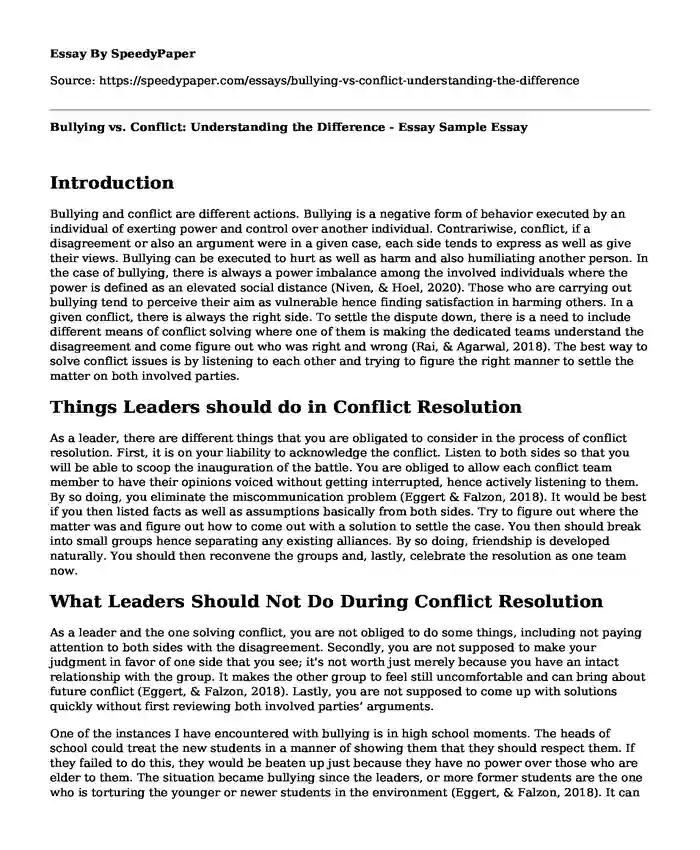Introduction
Bullying and conflict are different actions. Bullying is a negative form of behavior executed by an individual of exerting power and control over another individual. Contrariwise, conflict, if a disagreement or also an argument were in a given case, each side tends to express as well as give their views. Bullying can be executed to hurt as well as harm and also humiliating another person. In the case of bullying, there is always a power imbalance among the involved individuals where the power is defined as an elevated social distance (Niven, & Hoel, 2020). Those who are carrying out bullying tend to perceive their aim as vulnerable hence finding satisfaction in harming others. In a given conflict, there is always the right side. To settle the dispute down, there is a need to include different means of conflict solving where one of them is making the dedicated teams understand the disagreement and come figure out who was right and wrong (Rai, & Agarwal, 2018). The best way to solve conflict issues is by listening to each other and trying to figure the right manner to settle the matter on both involved parties.
Things Leaders should do in Conflict Resolution
As a leader, there are different things that you are obligated to consider in the process of conflict resolution. First, it is on your liability to acknowledge the conflict. Listen to both sides so that you will be able to scoop the inauguration of the battle. You are obliged to allow each conflict team member to have their opinions voiced without getting interrupted, hence actively listening to them. By so doing, you eliminate the miscommunication problem (Eggert & Falzon, 2018). It would be best if you then listed facts as well as assumptions basically from both sides. Try to figure out where the matter was and figure out how to come out with a solution to settle the case. You then should break into small groups hence separating any existing alliances. By so doing, friendship is developed naturally. You should then reconvene the groups and, lastly, celebrate the resolution as one team now.
What Leaders Should Not Do During Conflict Resolution
As a leader and the one solving conflict, you are not obliged to do some things, including not paying attention to both sides with the disagreement. Secondly, you are not supposed to make your judgment in favor of one side that you see; it's not worth just merely because you have an intact relationship with the group. It makes the other group to feel still uncomfortable and can bring about future conflict (Eggert, & Falzon, 2018). Lastly, you are not supposed to come up with solutions quickly without first reviewing both involved parties’ arguments.
One of the instances I have encountered with bullying is in high school moments. The heads of school could treat the new students in a manner of showing them that they should respect them. If they failed to do this, they would be beaten up just because they have no power over those who are elder to them. The situation became bullying since the leaders, or more former students are the one who is torturing the younger or newer students in the environment (Eggert, & Falzon, 2018). It can lead to disagreement hence conflict where the younger students can fight for their rights to be treated with respect.
As a leader, I would solve the case by making the elder students understand how wrong bullying can be and can affect the younger ones if it is executed to them both socially and physiologically.
References
Eggert, M., & Falzon, W. (2018). Resolving Conflict. Management Pocketbooks. https://books.google.com/books?hl=en&lr=&id=gNjwCgAAQBAJ&oi=fnd&pg=PA5&dq=resolving+conflict+and+Bullying&ots=EKIOXDdmL-&sig=sO-NlSDPyzw7thnzruMxFf8QzXk
Niven, K., & Hoel, H. (2020). The bystanders of workplace bullying. Bullying and Harassment in the Workplace: Theory, Research, and Practice, 385. https://scholar.google.com/scholar?cites=13671759845569628559&as_sdt=2005&sciodt=0,5&hl=en
Rai, A., & Agarwal, U. A. (2018). Workplace bullying and employee silence. Personnel Review. https://www.emerald.com/insight/content/doi/10.1108/PR-03-2017-0071/full/html
Cite this page
Bullying vs. Conflict: Understanding the Difference - Essay Sample. (2023, Nov 14). Retrieved from https://speedypaper.com/essays/bullying-vs-conflict-understanding-the-difference
Request Removal
If you are the original author of this essay and no longer wish to have it published on the SpeedyPaper website, please click below to request its removal:
- Police Brutality Paper Sample - The Case of Eric Garner
- Anti-Bullying Essay Sample for Free Use
- Racial Mistreatment Essay Sample
- Free Essay: Child Abuse and Inter-parental Violence Result in Adulthood Family Violence
- Essay Sample on Bullying Across Race and Gender
- Physical, Psychological and Sexual Abuse - Free Essay Sample
- Free Essay. Assessing and Treating Clients with Impulsivity, Compulsivity, and Addiction
Popular categories





